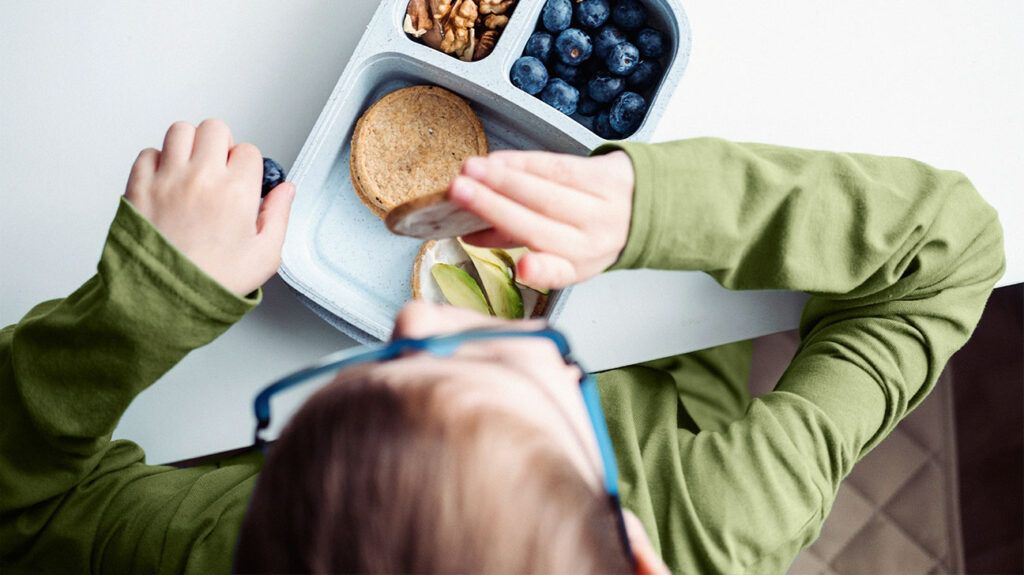A balanced diet that is rich in nutrients can boost the diversity of the gut microbiome and help manage ulcerative colitis (UC) in children. Avoiding highly processed foods and refined sugars will also benefit someone with UC.
UC is a form of chronic inflammatory bowel disease (IBD) that causes inflammation and ulceration of the inner lining of the large intestine.
Most cases of UC develop during the mid-teens or adulthood, but the condition can also occur in children. Treatment for UC typically involves some form of dietary management.

UC causes inflammation and ulceration of the inner lining of the large intestine.
This inflammation damages the intestinal barrier, which typically keeps harmful toxins inside the gut while allowing fluids and nutrients to pass from the gut into the blood.
According to a 2019 research review, the food a person eats can affect their gut microbiome. The gut microbiome is the ecosystem of microbes that live in the gut and likely play a key role in intestinal barrier function.
A healthy diet that is rich in nutrients can boost the diversity of the gut microbiome, which in turn may improve intestinal barrier function.
In contrast, a diet that is high in highly processed foods, refined sugar, and saturated fats can cause an imbalance in the gut microbiome, which may impair intestinal barrier function. This can lead to inadequate nutrient absorption, nutritional deficiencies, and impaired growth in children.
Diet is an important part of UC management because the foods a person eats may either worsen intestinal inflammation and symptoms or help relieve them.
The foods that parents or caregivers choose to include in a child’s diet will depend on what the child’s doctor recommends.
The doctor may suggest specific dietary changes based on the child’s disease activity. Some diets may be helpful for children with IBD, which includes UC and Crohn’s disease.
As a general guide, the Crohn’s and Colitis Foundation (CCF) recommends that children with IBD consume a healthy diet that contains a variety of foods from all major food groups, including:
- Fruits and vegetables: These provide fiber and essential nutrients such as vitamin C, potassium, and folate.
- Grains: These are high in fiber and energy and contain nutrients such as B vitamins, folate, and iron.
- Protein-rich foods: Protein options may include meats and plant-based foods such as soy, beans, nuts, and seeds. Protein is essential for growth and tissue repair.
- Dairy products: Dairy is an excellent source of calcium and vitamin D, which are essential for healthy bones and teeth.
- Foods high in healthy fats and oils: These foods are calorie-rich and help the body absorb fat-soluble nutrients. Examples include fish and fish oils, avocados, and nuts.
The CCF recommends that children with IBD avoid or limit certain foods during an IBD flare, such as:
Foods to limit may include:
- greasy or fried foods
- milk and dairy products if the child is lactose intolerant
- certain high fiber foods, such as:
- nuts
- seeds
- beans
- popcorn
- wheat bran
- green leafy vegetables
- raw fruits and vegetables
A parent or caregiver should consult a gastrointestinal specialist or pediatric dietitian before starting a child on any restrictive diet.
The CCF provides tips for caregivers, which focus on promoting a healthy diet and dietary habits in children with IBD:
- Involve the child in meal planning and preparation so they can learn to prepare healthy meals on their own.
- Bring the child grocery shopping so they can learn to read food labels and check for ingredients that may trigger their UC.
- Help the child keep a food journal so that they can identify potential trigger foods and try to avoid them in the future.
- Request adjustments and accommodations at school, such as permission for the child to eat snacks and drink liquids throughout the day.
- Ask the child’s doctor for a referral to a registered dietitian who can help with meal planning, or use the CCF’s online directory to find a dietitian in the local area.
Below are some answers to frequently asked questions about pediatric UC.
What is the most common finding in a child with ulcerative colitis?
One of the most common findings in a child with UC is bloody diarrhea.
Can I eat chocolate with ulcerative colitis?
Chocolate is high in sugar and contains lactose and caffeine.
While sugar, lactose, and caffeine do not necessarily trigger intestinal inflammation, they can cause unpleasant gastrointestinal symptoms in some people with IBD.
People who are sensitive to any of these ingredients may want to limit or avoid chocolate consumption.
Children with UC may experience inadequate nutrient absorption, which can lead to nutritional deficiencies and delayed growth.
Certain dietary changes may help reduce UC flares and associated symptoms. Possible strategies include eating a range of fruits, vegetables, and healthy protein sources and limiting consumption of any foods that have triggered symptoms in the past.
Caregivers should talk with their child’s doctor or dietitian before making changes to their child’s diet, as they will need to make sure that the diet is suitable and meets the child’s nutritional needs.
Caregivers can also take steps to promote healthy dietary habits in children with UC, such as taking them grocery shopping, involving them in meal planning and preparation, and helping them keep a food journal.


